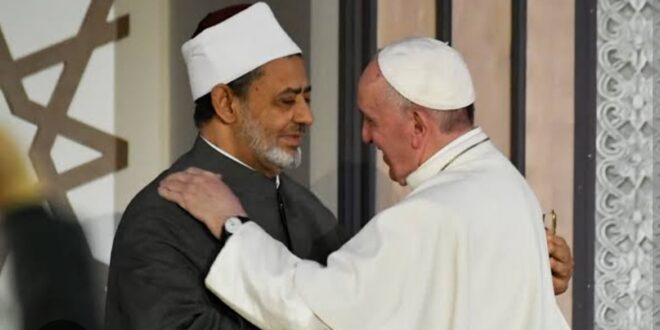Pope “Leo” and a Message of Hope for Humanity
By: Hossam Badrawi
In a time when voices calling for harmony have become rare, Pope Francis stood reaching out to the “other,” apologizing for the mistakes of the past and seeking a shared human ground among religions. His voice was the voice of conscience in a troubled world.
Although I am a Muslim by faith, I have always admired Pope Francis. He was not merely a religious leader for Catholics, but a living conscience for the world, speaking the language of compassion and humility, building bridges between religions and cultures, and advocating for social justice and peace.
He restored the church’s human spirit and placed the moral dimension at the heart of global politics. He was a visitor to the poor, a voice for the oppressed, and a sincere partner in dialogue with Islam, as exemplified in the Document on Human Fraternity which he signed with the Grand Imam of Al-Azhar.
I saw this document not as a mere agreement between two religious leaders, but as a civilizational vision that reflects a deep awareness that the challenges our world faces today — extremism, violence, division — cannot be met except through unity and cooperation among all religions and cultures.
One of the most powerful statements in the document reads:
“Religions have never, and must never be, a cause of war, conflict, or hatred. Rather, they must always serve as a driver for spreading the values of love and fraternity among humans.”
It also emphasizes the importance of promoting the concept of full citizenship and rejecting the term “minorities,” which carries with it a sense of marginalization and diminished rights.
With the election of Pope Leo in a grand ceremony befitting the majesty of history, I can only feel optimistic.
The background of this man, as I have read, suggests the arrival of a scientific mind, an openness to diverse cultures, and an ability to address the world in a new language — one that unites spirit and intellect, faith and science, religious roots and a modern universal vision.
The new pope, as his background suggests, does not come to repeat the past but to speak to the present with the language of the future. He is a man with a scientific foundation, combining theology, philosophy, and natural sciences, and has lived across different cultures, which has enabled him to see the world in its diversity, not its division.
Pope Leo XIV, formerly known as Cardinal Robert Francis Prevost,
holds a Bachelor’s degree in Mathematics from Villanova University (1977).
He speaks several languages fluently, including English, Spanish, Italian, French, and Portuguese, and he reads Latin and German.
As an Egyptian Muslim, I follow this event with great interest and hope. We live in a time where destinies are intertwined, and no nation can live in isolation or self-sufficiency. We need universal symbols who believe in humanity above any affiliation, who call for dialogue instead of confrontation, and who champion enlightened thought instead of doctrinal darkness.
I hope that “Leo” continues the path begun by Francis — defending the environment, the poor, women, and the marginalized. I hope he stands, as his predecessor did, against extremist nationalism and the political misuse of religion.
I hope he becomes a religious voice that restores the moral meaning of faith, not its authoritarian aspect. That he opens the doors of the Church wider, rather than shutting them to questions and differences.
From the bottom of my heart, I send him a human greeting and say:
“O new Pope, the world looks to you — not as a leader of a sect, but as a spiritual father to a world thirsty for meaning. Be a bridge, not a wall. Be a light, not an echo. For greatness today is not measured by what we possess, but by the values, compassion, and wisdom we radiate.”
And since revelation, at its core, is a call to light, not to fanaticism, I find in the words of the Qur’an an echo of what our world needs today:
“We made you into nations and tribes so that you may know one another.”
In this deep meaning, the new Pope becomes an ambassador for the higher values that unite people, no matter their languages or beliefs.
May “Leo” truly be a new voice of wisdom in an age of noise, a messenger of peace in a time of conflict, and a teacher of compassion in a world where the springs of mercy have run dry.
Would you like this translated text formatted as a PDF or ready for publishing?
 Dr. Hossam Badrawi Official Website
Dr. Hossam Badrawi Official Website


